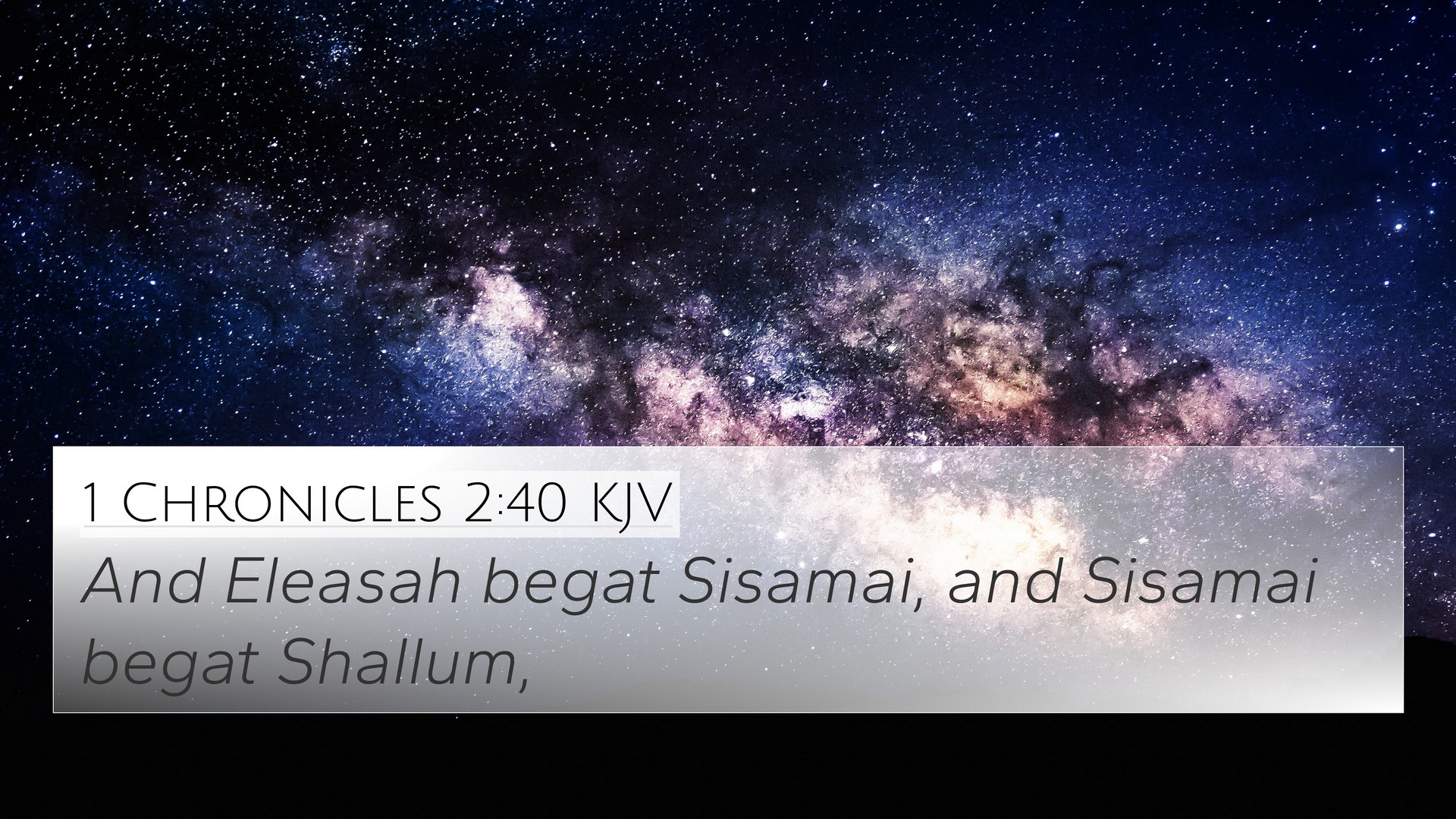Understanding 1 Chronicles 2:40
The verse 1 Chronicles 2:40 offers insights into the lineage of Judah, particularly focusing on the descendants of Caleb and the inheritance they received. The study of this verse can be further illuminated by examining its context, including historical and theological implications.
Verse Text
And Caleb the son of Hezron begat children of Azubah his wife, and of Jerioth: her sons are these; Jesher, and Shobab, and Ardon.
Commentary Insights
The commentaries by Matthew Henry, Albert Barnes, and Adam Clarke highlight several key themes regarding 1 Chronicles 2:40.
Matthew Henry's Commentary
-
Genealogical Importance:
Matthew Henry emphasizes the significance of genealogies in the Bible, showing how they connect to the fulfillment of God's promises to His people. Each name represents a link in God's faithfulness through generations.
-
Inheritances and Land:
Henry notes that Caleb received an inheritance in the Promised Land, and this verse signifies the continuity of that heritage through his descendants.
Albert Barnes' Notes
-
Families and Lineage:
Barnes points out the record of family lineage as a reflection of the importance placed on family and tribal identity in Israel, asserting that understanding these patrons can illuminate various themes within the scriptures.
-
Connection to Larger Themes:
This verse acts as a bridge that connects to broader themes in Scripture concerning the tribes of Israel and their movements throughout history.
Adam Clarke's Commentary
-
Historical Context:
Clarke provides a historical framework that situates Caleb’s lineage in the context of Israel’s conquest of Canaan, helping readers appreciate the broader narrative of the Old Testament.
-
Cultural Reflections:
He discusses the cultural significance of inheritances and how they illustrate God's providence in placing individuals within a tribe, thereby outlining the importance of land and identity for the Israelites.
Bible Verse Cross-References
To understand this verse better, we can explore how it connects to other parts of the Bible. Here are some significant cross-references:
- Joshua 14:6-12: This passage describes Caleb's request for his inheritance and his faithfulness in conquering the land.
- Numbers 14:24: It reinforces Caleb's faith and the reward God promised him due to his unwavering spirit.
- 1 Chronicles 4:15: This verse continues the lineage of Caleb, pointing out the importance of familial connections.
- Hebrews 11:32-34: A recognition of Caleb alongside other faithful servants, emphasizing faith in action.
- Matthew 1:2-3: This genealogy links Old Testament figures with new covenant themes and emphasizes the significance of lineage.
- Revelation 7:4-8: The tribes of Israel are mentioned, underscoring the enduring legacy of the lineage initiated in the Old Testament.
- Deuteronomy 1:36: It reiterates God's promise of the land to Caleb, enhancing the understanding of his role in God's plan.
Thematic Bible Verse Connections
The themes of faith, heritage, and divine promise are prevalent throughout the scriptures. In studying 1 Chronicles 2:40, we can explore connections to other relevant verses that emphasize these motifs:
-
Faithfulness: Hebrews 11:1-6 discusses faith and its importance in understanding God’s promises, highlighting the virtues exhibited by Caleb.
-
God's Promises: Psalm 37:29 assures believers of their inheritance on the land, an echo of the assurances given to Caleb's lineage.
-
Family and Legacy: Proverbs 13:22 speaks to the value of leaving an inheritance for one’s heirs, aligning with the notion of Caleb’s family receiving their land.
Tools for Bible Cross-Referencing
Utilizing effective tools for cross-referencing can enhance your study and understanding of scripture. Here are some recommended resources:
- Bible Concordance: A key resource for finding themes, keywords, and related verses.
- Bible Cross-Reference Guide: Useful for systematic study and comprehensive scripture analysis.
- Cross-Reference Bible Study Materials: Offers in-depth studies of interconnections in biblical texts.
Conclusion
The study of 1 Chronicles 2:40 extends beyond mere historical record; it serves as a reminder of God’s faithfulness across generations. By utilizing cross-references and understanding the broader context, one can appreciate the depth of biblical literature and its application to faith today.


